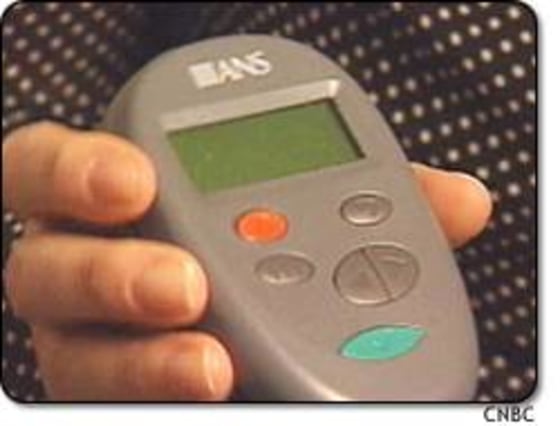More than 75 million Americans suffer from chronic pain — but only two percent of patients get satisfactory treatment. Now, medical device makers are finding ways to soothe patients — and their own bottom line. One such company has developed an implant that can literally send shivers up your spine.
For Michelle Revello, life really did begin again at 40. Six years of debilitating pain caused by spinal nerve damage from a tumor is gone after a surgically-implanted stimulator has given her new lease on life.
“It’s my lifeline,” she said. “It keeps me going. I need it. If I don’t have it I can tell the difference.”
Revello’s lifeline began when her doctor implanted small electrodes above the spinal cord and placed a pacemaker-like device under the skin. Six months later her scars are barely visible.
On the outside, a paddle and a stimulator control device — about the size of a PDA — are keeping her virtually pain free day and night. It’s a breakthrough alternative to potentially habit-forming drugs, according to Revello’s surgeon, Dr. Giancarlo Barolat, the Director of Neurosurgical Services at Thomas Jefferson University Hospital in Phildelphia.
“She has full access to the controls of the stimulator,” said Barolat. “She can turn it on, she can turn it off, she can increase the amplitude, just like with a stereo.”
“I feel a little bit like the bionic woman, you know?” said Revello. “There’s no negative drawback to it. If it’s not on, I’m in pain. If it’s on I’m out of pain. It’s just that simple.”
Barolat is a worldwide expert in treating pain, especially stimulation therapy, otherwise known as neuromodulation. He says it’s the best option for the kind of chronic, constant pain that simply won’t go away.
“Before we had access to neuromodulation all that we would do was cut parts of the nervous system,” said Barolot. “Now, instead of working against the nervous system, we work with the nervous system. And instead of trying to stop the signals, we try to modify the signals.”
Neuromodulation is also stimulating the medical device industry, generating over $704 million in revenues last year and projected to top the $1 billion mark by 2005.
Advanced Neuromodulation Systems — the company that makes Revello’s implant — recently reported that third-quarter earnings were up more than 100 percent year over year. Leading the way for ANS is its chronic pain products, where profits were up 78 percent.
“They have had tremendous success in offering a product which offers superior features to some of the competitive offerings,” said Chris Shibutani, a securities analyst at J.P. Morgan who is also a physician. “They also benefit from very high barriers to entry with only one major competitor, obviously Medtronic, the dominant name in the industry.”
Pain management is emerging as both a public health and economic concern. That’s because pain leads to more than 50 million lost workdays and $3 billion in lost wages each year.
But with the devices and implant surgery costing between $40,000 and $50,000, health insurers are not totally sold. Patients often end up negotiating coverage and reimbursements to doctors that are sometimes just a fraction of the true costs.
Many in the medical profession still view device implant surgery as a last resort. Prescription painkiller abuse is in the headlines, and the recent disclosure by radio talk show host Rush Limbaugh of his own years of addiction to painkillers helps strengthen case for implantation therapy.
“If you compare it to the complications or the side effects of taking narcotics for years and years and years that surgical procedure really become preferable,” said Barolat.
Still, ANS executives and industry experts are studying a vast array of potential applications including epilepsy, Parkinson’s, Alzheimer’s and even depression. Shibutani says the promise is there, but it won’t happen overnight.
“I do think that other indications such as behavior modification, we’re seeing them approach the psychiatric conditions including depression are very impressive markets,” he said. “But the technology will take a while to develop. I think were still in the very early days and the path to market I think will be fairly complicated.”
Meantime, Michelle Revello enjoyed her first pain-free summer in six years. Whether bike riding with her two sons or simply lounging at the backyard pool with her husband, Jeff, her stimulator is never very far away.
(CNBC's Steve Lewis contributed to this report.)
